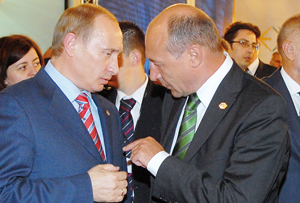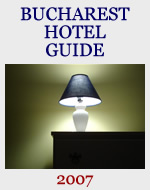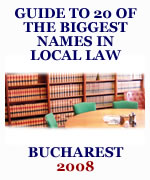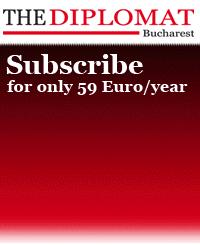Stuck in the middle with EU
Romania is a willing partner of the Euro-Atlantic alliance, but this relationship has seen its ties with Russia and the Republic of Moldova deteriorate in the last three years, reports Ana-Maria Nitoi
 |
|
|||||||||||||
Romania’s membership of the European Union and NATO are guiding its foreign policy objectives. The country is seen as a follower of the international consensus, rather than a pioneer of new policy. It has tended to side with the largest member states, such as the USA and UK, on policies such as support for the war in Iraq.
Under NATO supervision, the country has around 600 military personnel in Afghanistan. Unlike Germany, Italy and France, which have refused to send their soldiers to the most dangerous theatres of warfare in southern Afghanistan, Romanian soldiers are in the line of fire.
This willingness to take part in high-risk combat is an important reason why Romania was able to hold the NATO conference this April, argues Liviu Muresan, president of think tank Eurisc Foundation.
Romania’s current President opened his mandate in 2005 by talking of a Bucharest – London - Washington DC axis. The US has operational military bases in Romania and the new EU country’s soldiers continue to serve in Iraq.
Prime Minister Calin Popescu Tariceanu has stated that USA’s proposed missile defence system in Poland should be shifted eastward, to fully cover Romania and Bulgaria, because NATO’s idea of solidarity should extend to southeast Europe.
The US plan includes ten ground-based interceptors in Poland and a tracking radar in the Czech Republic to defend European countries under threat from a long-range attack from the Middle East. The anti-missile shield will cover only 70 per cent of Romania’s territory, an axis north of Drobeta Turnu Severin in south-west Romania to Galati in the East, ironically missing out the US bases near Constanta.
'1') {
require('php/art_auth.inc');
}
?>
The NATO Summit in April will include discussions on building a military base for anti-missile defence in addition to those in Greenland and the UK. This will protect countries not covered by the planned US defence system: Turkey, Bulgaria, Greece, south Romania, the southern Balkans and south Italy.
Prime Minister Tariceanu has said that any solution to this defence dilemma should not upset Russia.
But this is wishful thinking.
Moscow sees the US military plans in Europe as a threat, despite US President George W Bush’s comments to the contrary. “The missile defences we can employ would be easily overwhelmed by Russia’s nuclear arsenal,” said Bush. “The Cold War is over.”
Below, The Diplomat and experts analyse Romania’s relationships with some of its regional neighbours.
Republic of Moldova: worsening
Romania’s relationship with the Republic of Moldova is now at rock bottom, but Bucharest still shows its full support for Chisinau’s EU aspirations.
The ex-USSR nation has accused Romanian diplomats in Chisinau of taking bribes for visas, while the number of Moldovans successfully applying for Romanian citizenship is miniscule in relation to those who can legally qualify for the status.
The current Moldovan leadership, which has swayed between the influence of Brussels and Moscow, has bent towards the Kremlin in the last three years.
Moldovan President Vladimir Voronin is constantly berating Romania for the country’s inability to officially recognise the Moldovan ethnicity and language, which Romanians consider to be a dialect of their own tongue. Due to this, Voronin accuses Romania of undermining the independence, identity and sovereignty of his Republic. The President has arguably gone too far in his attacks on Bucharest in order to show his allegiance to Russia. “Chisinau believes it can negotiate with the Russian Federation only at the same time as attacking Romania,” says Iulian Chifu, director of the Center for Conflict Prevention and Early Warning.
The Republic of Moldova’s most pressing security issue is to solve the problem of its breakaway self-declared province, Transnistria. There have been rumours for some years that Voronin is negotiating a settlement with Russian President Vladimir Putin. Such a deal would ask the Transnistrian Government to end its claim on independence in return for a high degree of autonomy and a greater say in Moldovan affairs of state.
Transnistria may be emboldened to call again for separation from Chisinau following the precedent set by Kosovo.
“In Transnistria’s case we don’t have an ethnic conflict such as in Kosovo,” says Radu Gorincioi, director of the NATO Information Centre in Republic of Moldova. “There is a political, geostrategic and military aspect to the conflict which will prevent the breakaway province being internationally recognised as independent.”
Romanian MEP Adrian Severin believes that Moscow wants to transform Chisinau into a Russian stronghold which will become a thorn in the side of the pro-western Ukrainian Government.
“Russia’s comeback into the Balkans is a rediscovery of the advantages of a Russian Trojan Horse inside the EU,” adds Severin, “and Moldova is another way to get closer to its southeastern European strategic partners, such as Serbia and Bulgaria.”
Russia: appearing to ignore Romania
Romania’s relationship with Russia is of concern, especially regarding energy security. Russia’s plans for new oil and gas distribution channels to western Europe by-pass Romania in favour of Bulgaria and Serbia.
“Romania has a very good diplomatic experience in mediating with international actors, except with Russia,” says Olga Vorkunova, a senior expert for the Russian Academy of Science. Having a leading role in the co-operation between the states in the Black Sea area is one of Romania’s foreign policy objectives and President Basescu has organised transnational forums on this issue. But nations like Russia, Turkey and Bulgaria do not take Romania’s lofty ambitions seriously.
Serbia: improving relations
Considering the support given by Bucharest to Belgrade regarding Kosovo’s declaration of independence, Romania and Serbia have become even better friends. Recently, the Romanian flag has been waved in Belgrade by protesters against the international recognition of Kosovo’s independence. At the beginning of 2008, President Basescu visited Serbian pro-EU counterpart Boris Tadic and assured him of the EU’s commitment to Serbian membership.
Later, President Tadic came to Bucharest for his first visit abroad after Kosovo’s dramatic declaration, to show his appreciation for Romania’s support. This could be mutually beneficial. Belgrade can act as a bridge for Romania to Russia and Bucharest can act as a bridge for Serbia to the European Union
Kosovo: firm non-recognition
Romanian politicians fear that Kosovo could be considered a precedent for the 1.5 million Hungarian-speaking community in the three Romanian counties Covasna, Harghita and Mures. “If any unsatisfied community, and not a people, would be able to legitimately become an independent state, we would have no limit and no criteria in regard to the right of recognising self-determination decisions,” says Romanian MEP Adrian Severin.
But Iulian Chifu argues that Romania should be afraid more of a Kosovo with autonomy. “This is because the [Hungarian-speaking] Szekler community wants autonomy in the country called Romania and not independence like the Albanians in Kosovo,” he says.
Ukraine: minor differences
Romania’s relationship with the pro-western leadership of Ukraine is good except for two territorial battles between Kiev and Bucharest which are being fought in the international courts. Romania opposes a Ukrainian project to build in the Danube Delta a navigatible canal to connect the delta to the Black Sea which some environmentalists argue damages the fragile ecosystem of the UNESCO-protected natural reserve.
In the Black Sea there is also a stony protuberance which each of the two countries claim as its own. The oil and gas deposits under the sea are at stake in this debate. Without going into too much detail, if Ukraine can prove that the uninhabited outcrop is an ‘island’ it wins the territory and if Romania can prove it is a ‘rock’, the EU nation wins. So Ukraine is trying to show that Snake Island is habitable by building a village on its rocks.
Severin says Romania has a strong case. “Ukraine should follow its European and Euro-Atlantic objectives and consolidate a solid partnership with Romania,” he adds, “instead of continuing this fight for a few more kilometres of maritime border in the Black Sea or by building this canal in a natural habitat.”
Bulgaria: neutral rivalry
Recently Romania and Bulgaria have been healthy competitors, as both countries have spent the last decade attempting to outdo one another in qualifying for entry into NATO and the EU. Both countries argue that they are the EU country with the most strategic position in energy security in the Black Sea region. For now it seems that Bulgaria is winning over Romania because the Russian-backed gas pipeline South Stream, which does not pass through Romania, has more chances of construction than the Romanian-favoured Nabucco gas pipeline project.
Hungary: stable relations
Romania is on good terms with its western neighbour Hungary. Budapest has given much political and economical support to its largest community abroad, the 1.5 million Hungarian-speaking people who live in Romania. In general, Romania has respected the rights of this minority. This is in part due to the efforts of the powerful political party, the Democratic Union of Hungarians in Romania (UDMR), which has been in every coalition Government in Romania since 1996.

















